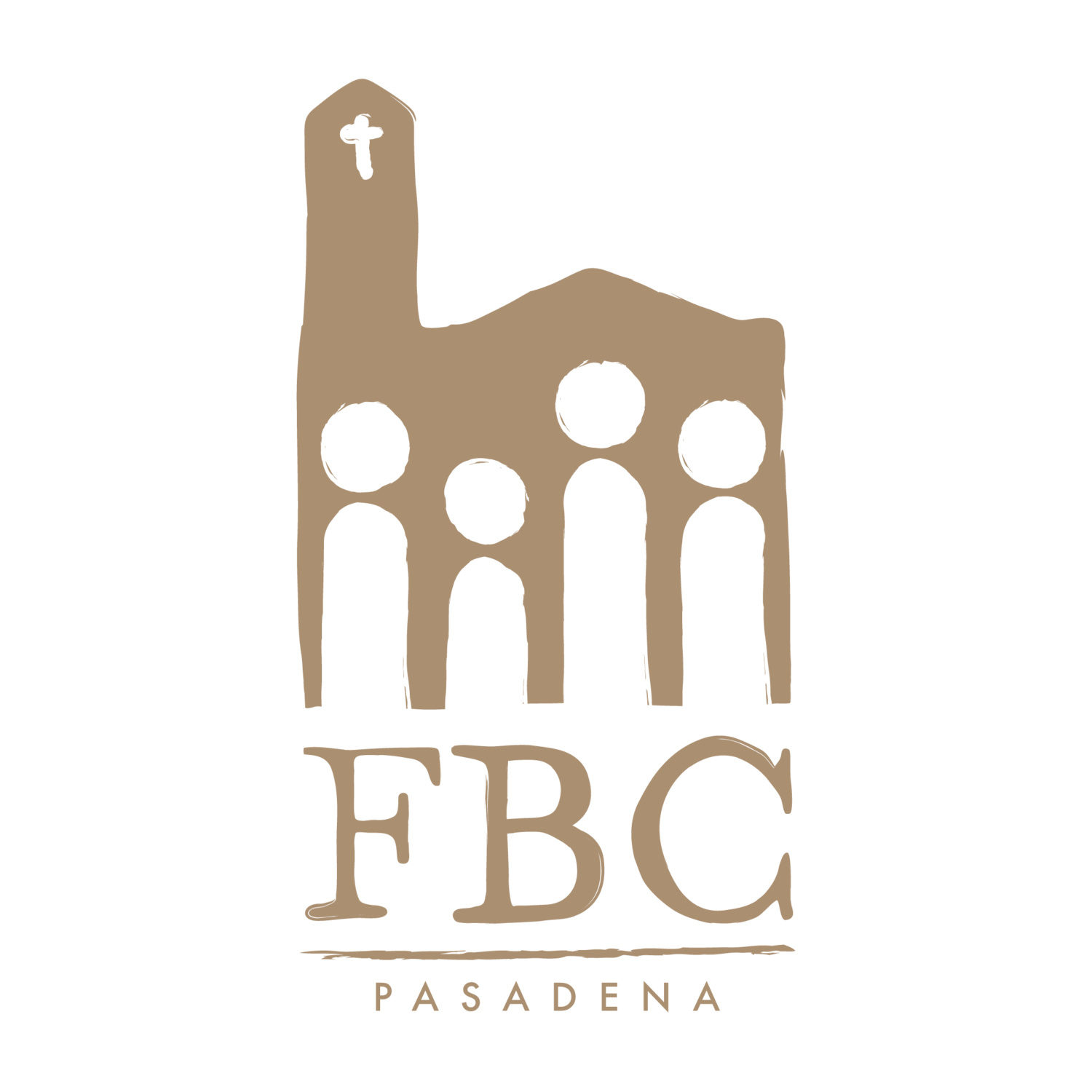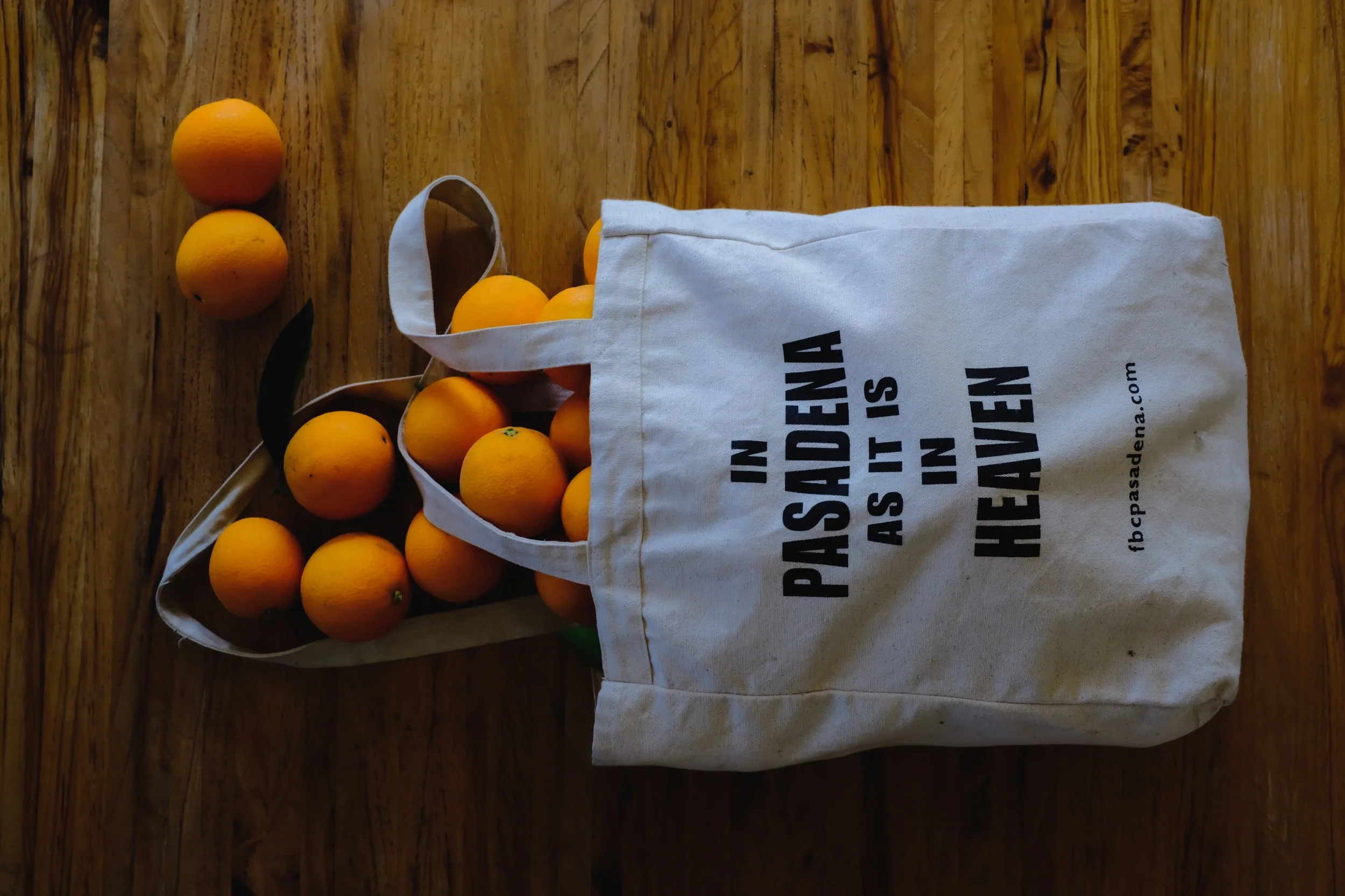[The following writing is part of an ongoing project that will eventually be printed and bound for our community in the form of a small book. This book will serve as a thesis statement for our community, illustrating both who we are as a church in this moment and also who we are becoming as we deepen these convictions together. My hope is to complete this writing project during the summer of 2022. -Pastor John Jay]
In Pasadena as it is in Heaven (a love letter)
INTRODUCTION
I think it started in Boston by way of Mississippi, but I first saw the phrase in Durham. So I commissioned the printshop that made the Boston and Durham versions to create a Pasadena iteration (thanks, Old Try Letterpress). They recommended we change the language to "In Los Angeles as it is in Heaven." It would apparently have broader appeal, and they could list the custom prints on their own design site since LA is more familiar than Pasadena. I asked them to stick with Pasadena, and the phrase that adorns our banners and website was born: In Pasadena as it is in Heaven.
That decision to bypass broad appeal for focused attention has guided a lot of our leadership decisions since I have been pastor here. Lots of people who count First Baptist as their church live outside of Pasadena, but when they come to worship with their church friends and family, they are physically located in the heart of our city. Pasadena has a history that is unique within the greater Los Angeles area, and our church has been a part of that history for over 130 years. In this pamphlet I want to share with you how that simple phrase captured my imagination and why I find it a powerful set of words to guide our church through the world as we find it. To do that, we first need to understand the way that the Bible structures poetry...
THE PHRASE AT THE CENTER OF THE PRAYER
AT THE CENTER OF THE SERMON
AT THE CENTER OF LEVITICUS
AT THE CENTER OF TORAH
Billy Collins has a poem about teaching poetry to his students called, "Introduction to Poetry."
I ask them to take a poem
and hold it up to the light
like a color slide
or press an ear against its hive.
I say drop a mouse into a poem
and watch him probe his way out,
or walk inside the poem’s room
and feel the walls for a light switch.
I want them to waterski
across the surface of a poem
waving at the author’s name on the shore.
But all they want to do
is tie the poem to a chair with rope
and torture a confession out of it.
They begin beating it with a hose
to find out what it really means.
Reading Collins and his mouse in the maze, I cannot help but think about the ways I was taught to approach Scripture in all its poetry and metaphor and hyperbolic language. Is it science? History? Verified court documents? Legal code? I just wanted to nail it down so I could rest in certainty. But the Bible kept slipping through my attempts to pin it down. Please join me and put away your torture devices and let me share another way to receive the poetry of Scripture. The Bible is revealing more than we can take in from any one reading or hearing. This simple fact should gift us with humility and curiosity, and free us from the illusion that we will ever arrive at the definitive, final interpretation of any given text. This is the durable genius of the Biblical writers and editors. As one theologian said, trying to excavate all meanings from the Bible is like trying to drain the ocean with a spoon.
The familiar line we use throughout our church, “In Pasadena as it is in Heaven,” comes from the middle of what is known as the Lord's Prayer from Matthew chapter 6. Here is the prayer in its entirety from the New International Version:
Our Father in heaven,
hallowed be your name,
your kingdom come,
your will be done,
On earth as it is in heaven.
Give us today our daily bread.
And forgive us our debts,
as we also have forgiven our debtors.
And lead us not into temptation,
but deliver us from the evil one.
You see that line in the middle there? On earth as it is in heaven. Or in the greek it reads, Hōs en ouranō, kai epi gās. I want you to see the greek that is underneath our translations because there is some poetic finesse in the ordering of the words. The English gets them out of order. It translates more honestly “as in heaven, so also on earth.” Why does this matter? Well, the whole structure of the prayer follows an arch of movement that is the main flow of God’s power and Spirit throughout the entirety of the Bible. God’s realm is envisioned as “the heavens,” which is shorthand for the space in time where God’s presence and power are most evident, where the distance between God’s intention and creation’s reality are aligned. Heaven is less a destination we experience at death and more a dimension of this reality experienced as we align with God’s Spirit and power. Death simply strips away the last pretense. The prayer Jesus teaches takes this working understanding of Heaven and pulls it toward the realm of humanity and the rest of creation.
God is not content to stay distant but continually draws close to lift creation up. This is the movement of the early chapters of Genesis in the creation epic. This is the movement of the Exodus, where God sees the suffering of a group of forgotten and abused people, remembers their history and hopes, and moves toward them to carry them to a better home. This is also the story of Jesus Christ. We call it the incarnation, where carnal matter is infused with the sacred presence of Heaven. You might picture two arrows, one pointing down from heaven to earth and one pointing back up. Except that is not quite right. Imagine an arrow appearing from another realm, enveloping you and me and the big magnolia in the yard and the stars and mountains and cute little squirrels and all the rest of creation, and carrying us home. And by home, I mean carrying us deeper into the fullness of this very moment that is suffused with Heaven.
The middle line of the prayer follows after a string of demands the person praying makes to God.
Make your name sacred.
Bring your kingdom.
Do something!
As it is wherever you are, God, make it so where we are. Bring us some of that goodness. Here. Now.
This little booklet is my attempt to sketch out how our church community might embrace our role in nurturing Heaven in the places we call home. May it be so in Pasadena as it is Heaven…

